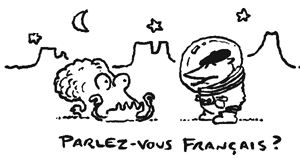|
|
An interrogative construction is a grammatical form used to ask a question.
There are two kinds of questions: yes/no questions and information questions.
So-called yes/no questions may be answered with a simple 'yes' or 'no'.

| Are you a student at the University of Texas? |
| Have you ever been to Sixth Street or Barton Springs? |
| Do you know how many Aggies it takes to screw in a lightbulb? |

Information questions contain a specific interrogative word (who,
what, when, why, how) and cannot be answered with a yes or no. Their
purpose is to elicit a specific piece of information.

 |
Who is Tex? |
| |
When did he come to Texas? |
| |
How did he learn French? |
 |
Est-ce que vous parlez français? |
|
Do you speak French? |

Besides using 'est-ce que', questions in French can be formed by
inversion of the subject and verb.

 |
Parlez-vous français? |
|
Do you speak French? |
|
 |

formulating questions
The word 'do' is used in English question formation.
In similar fashion, French yes / no questions can be formed with the phraseest-ce que.

There are several other ways to ask a question in French. For
instance, a tag question is a
question word or phrase 'tagged' on to the end of a statement which
requires a confirmation with a 'yes' or 'no' answer.

| Vous parlez français, n'est-ce pas? |
|
You speak French, don't you? |

Finally, the most common way to ask a question in French conversation is to use rising intonation.
In this kind of interrogative construction, the word order is the same as a declarative sentence, but the speaker's voice rises at the end to signal the question.

 |
| Vous parlez français? |
|
You speak French? |
|
|
|
|
|